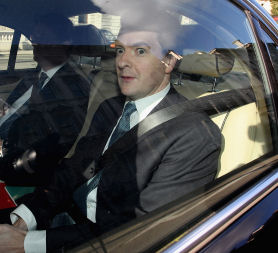Spending review: The age of austerity and uncertainty
In the wake of George Osborne’s deep spending cuts, “we are entering not just an age of austerity, but one of uncertainty”, writes Gaby Hinsliff.

It wasn’t quite ‘the Lady’s not for turning.’ But when George Osborne warned yesterday that retreating over spending cuts would mean the ‘road to economic ruin’, he identified the big question mark hanging over his review. It’s one thing to announce the deepest retrenchment in a generation. It’s quite another to deliver it.
Not least because with the exception of welfare cuts, much of the surgery is deliberately out of the government’s hands. True to his decentralising beliefs (and perhaps a desire to spread blame) the Chancellor has passed the scalpel on: in huge swathes of public services, it’s local government and others – from chief constables to Sport England – who’ll decide exactly what suffers. But can they actually deliver what he wants?
Councils
The accountancy firm KPMG warned yesterday some councils simply won’t be able to cope with cuts of 28 per cent: it thinks some will run out of money, requiring bailouts.
The Chancellor sent an important signal yesterday that he’s resigned to wretched unpopularity.
Labour councils may refuse to do Osborne’s dirty work, as the hard left in Liverpool did during the 1980s: Ken Livingstone is already running for the London Mayoralty on a platform of fighting cuts, evoking memories of the GLC battling Margaret Thatcher.
But more acute pressure may come from Conservative and Liberal Democrat councils fearing electoral oblivion if they follow orders. We are entering not just an age of austerity but one of uncertainty, where government can’t quite predict how cuts will be delivered and voters can’t quite know what’s at risk – and uncertainty saps consumer confidence.
Legal challenges
Legal challenges loom, with the Welsh broadcaster S4C threatening to seek judicial review of budget cuts. Making savings can also be contractually difficult, as defence ministers found when they considered cancelling two new aircraft carriers.
Strikes, protests and what some ministers fear could be poll tax-style riots will only add to a serious test of nerve for a government that occasionally wobbles under fire – signalling child benefit cuts would be softened by tax breaks for marriage, for example.
So the Chancellor sent an important signal yesterday that he’s resigned to wretched unpopularity, if necessary. David Cameron, however, is used to being liked. If cuts are to be delivered, he may need to get over that.
Gaby Hinsliff is former Political Editor of the Observer newspaper.